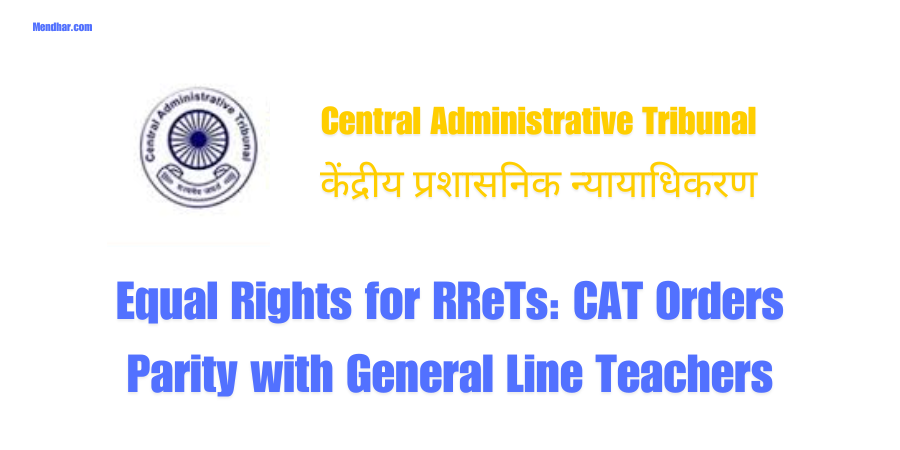Table of Contents
ToggleEqual Rights for RReTs: CAT Orders Parity with General Line Teachers

In a historic and transformative ruling, the Central Administrative Tribunal (CAT) has declared that Regularized Rehbar-e-Taleem (RReTs) teachers in Jammu and Kashmir must be treated equally with General Line Teachers in all aspects. The equal rights for RReTs judgment brings long-awaited relief to thousands of RReTs who have faced discriminatory policies, ensuring a unified and fair treatment within the teaching cadre.
The Rehbar-e-Taleem (ReTs) initiative began in 2001 to increase student enrollment in government schools, particularly at the upper primary level. Over 35,000 teachers were recruited under the program, with many transitioning to Regularized Rehbar-e-Taleem (RReTs) after completing five years of service. These RReTs were categorized as Grade-II and Grade-III teachers based on their educational qualifications. However, despite being regularized, they faced differential treatment compared to General Line Teachers.
The CAT ruling firmly stated that such disparities violate constitutional principles. It emphasized that once RReTs are regularized into the same cadre as General Line Teachers, they must receive equal rights for RReTs in all professional matters.
Key Observations from the CAT Judgment:
The CAT judgment underscored several fundamental principles:
- Employees absorbed into a single cadre must be treated equally, irrespective of their recruitment source.
- The initial recruitment method, termed the “birthmark,” becomes irrelevant once employees join a unified cadre.
- Discrimination based on recruitment methods violates Articles 14 and 16 of the Constitution of India, which guarantee equality and prohibit discrimination in public employment.
By highlighting the importance of equal rights for RReTs, the CAT reinforced that justice and equality must prevail in public service employment policies.
Impact of the Ruling:
The CAT ruling invalidates several government orders that perpetuated inequalities against RReTs. Among the orders quashed were:
- Government Order No. 22.01.2019 – Contained provisions allowing differential treatment of RReTs.
- Order dated 25.07.2022 – Directed the repatriation of RReTs to their original postings, affecting their stability.
- Transfer Policy dated 24.04.2023 – Included clauses that restricted transfer opportunities for RReTs.
- Notification No. 01 dated 26.04.2023 – Contained discriminatory rules specific to RReTs.
By guaranteeing equal rights for RReTs with General Line Teachers, the CAT ensured fairness in all aspects, including transfers, promotions, and workplace conditions.
Broader Implications for RReTs and the Education Sector
The CAT ruling is a milestone for equal rights for RReTs and has far-reaching implications:
- It acknowledges the vital contributions of RReTs to the education system in Jammu and Kashmir, enhancing their morale and dedication.
- By eliminating arbitrary distinctions, the decision paves the way for a more cohesive and equitable teaching cadre.
- The judgment sets a precedent for addressing similar discriminatory policies in other public sectors.
This decision also reinforces the importance of constitutional principles in policymaking, highlighting that any deviation from equality undermines employee confidence and professional harmony.
Strengthening the Education System Through Equity
Ensuring equal rights for RReTs is not just about achieving fairness; it is a step toward building a stronger education system. When all teachers in the same cadre receive equal treatment, it fosters unity and enhances their collective commitment to their profession.
This landmark judgment will have a positive ripple effect on the education sector in Jammu and Kashmir. By recognizing the contributions of RReTs and addressing their grievances, the CAT ruling ensures that they remain motivated to deliver quality education.
Conclusion
The CAT’s decision to grant equal rights for RReTs is a triumph for justice and equity. By treating RReTs on par with General Line Teachers, the ruling eliminates years of discrimination and upholds the constitutional guarantee of equality.
This judgment is not just a policy correction; it is a reaffirmation of the principles of fairness and justice in public employment. The recognition of equal rights for RReTs will strengthen the teaching cadre and enhance the overall efficiency and equity of the education system in Jammu and Kashmir.


